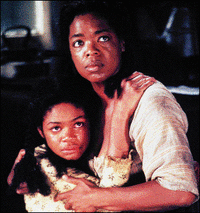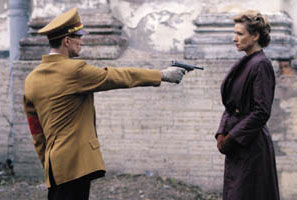June 09, 2005
Fear and misery in the third reich 'n' roll
 |
I (belatedly) went to see the traumatically powerful Downfall a couple of nights ago at the behest of Karl Kraft. Overhype of mediocre tat renders one suspicious of any praise surrounding contemporary films, but this is a genuine masterpiece, and one that can only be appreciated fully in the cinema environment, where the relentless pummeling of the Soviet artillery and the claustrophobic airlessness of the Hitler bunker have a crushingly visceral presence.
Downfall, actually, is the second film this year (the first was The Aviator) to flout my otherwise reliable dictum that movies based on real life are to be avoided. But the reason why both work is that they describe situations in which reality had itself gone psychotic. As Ballard has observed, the Nazi delirium was one of those moments when the distinction between the internal and the external world no longer held: hell has erupted on earth, there is no escape, no future, and you know it...
Downfall is fascinating because it closely and I'm assuming meticulously documents the 'line of abolition' that Deleuze-Guattari claim is constitutive of Nazism. For Deleuze-Guattari, who borrow the idea from Virilio, the Nazis' scheduled auto-annihilation - 'if are defeated, better that the nation should perish' - was less a forced contingency than the realization, the very consummation, of the Nazi project. Deleuze-Guattari's account might be dubious empirically (it was certainly hotly contested in intense discussions last night at Towers of Infinite Thought), but the great service it provides for cultural analysis may not be the idea that Nazism is suicidal, but the thought that the suicidal, the self-destructive is Nazi.
Since at least the death of Chatterton, popular culture has found the temptation to glamourize self-destruction irresistible. The Nazis provide the definitive Twentieth Century version of this age-old Romance of Death. As Ballard noted in his essay on Hitler, 'Alphabets of Reason', the Nazis are a creepily modern phenomenon, their technicolour glamour a world away from the fussy frock-coated figures of the Edwardian British ruling elite. The Nazis' facility with broadcasting laid the groundwork for the media landscape we now occupy. Hitler as the first rock star?
Downfall takes us through the scenes in which the Nazi party disintegrates only for the Third Reich 'n' Roll to begin. The death of the frontman is the blood-sacrifical rite that will guarantee a hideous immortality. Hitler was the first Twentieth Century figure to pass from historical individuality to becoming a permanent archetype-artifact in the the McLuhan-Ballard media unconscious. After him, Kennedy, Malcolm X, King, Morrison, Hendrix, Curtis seem local, particular, whereas Hitler comes to stand for a general principle, for modern Evil itself.
As spectators of Downfall, we spend most of the time in the Fuhrer Bunker, forced into an unsettling sympathy if not for the Reich's leaders than for those who were loyal to them, the secretaries and functionaries who admired, by no means fanatically, Hitler and National Socialism. Meanwhile, the glimpses we have of the Berlin above show a landscape out of The Triumph of Death, a city devolving into total anomie: child conscripts, vigilante hangings, intoxicated reveling, carnivalesque sexual excess.
While those scenes play out, you can almost hear Johnny Rotten leering, 'when there's no future how can there be sin?' (Although for Germany, in fact, there was nothing but the future: immediate postwar Germany was subject to a willed amnesia, a disavowal of cultural memory). It's no accident that post-punk in many ways begins here. As the Pistols pursue their own line of abolition into the scorched earth nihilism of 'Belsen was a Gas' and 'Holidays in the Sun', they keep returning to the barbed-wire scarred Boschscape of Nazi Berlin and the Pynchon Zone it became after the war. Siouxsie famously sported a swastika for a while, and although much of the flaunting of the Nazi imagery was supposedly for superficial shock effects, the punk-Nazi connection was about much more than trite transgressivism. Punk's very 1970s, very British fixation on Nazism posed ethical questions so troubling they could barely be articulated explicitly: what were the limits of liberal tolerance? Could Britain be so sure that it had differentiated itself from Nazism (a particularly pressing issue at a time that the NF was gathering an unprecedented degree of support)? And, most unsettling of all, what is it that separates Nazi Evil from heroic Good?
Downfall poses that last question with a real force, and it is a question that has a special resonance at the moment given Zizek and Zupancic's theory of the ungrounded Act as the very definition of the ethical. As I watched the most 'monstrous' act depicted in the film, Frau Goebbels' drugging and then poisoning her children - better this 'redemption', she reasoned, than that they be left in a world without National Socialism - I was struck by the parallel with Sethe in Toni Morrison's Beloved, who kills one of her children rather than let it fall into the hands of the slavers. What is to separate Frau Goebbels' act of abominable Evil from Sethe's act of heroic Good? (Those who have read The Fragile Absolute will remember that Zizek uses Sethe precisely as an example of a Good entirely alien to liberal morality, with its ethic of enlightened self-interest).

Downfall seems to invite us to sympathise with the 'liberal Nazis', the 'reasonable' doctor, for instance, who wants to keep the medical services running and is disgusted and aghast at the 'senseless, suicidal' behaviour that results from seeing Duty through to the end; the General who wants to end the war to protect the lives of civilians. But these 'pragmatic humanitarian' figures are the least defensible because they are not prepared to follow the principles of their actions to the end (if they were committed to Nazism, why not die for it? If they weren't , why not resist it?) Strangely, it is almost as if the film seems to suggest that what was irredeemably malevolent about the Nazis was their will to die for the cause.
In spite of ourselves, we find ourselves thinking that the Evil Nazis - those who totally identify with the Nazi project and who destroy themselves when it is clear that has failed - attain a certain tragic heroism by refusing to give up on their fundamental commitment. All of which leads us back to the old question: does the Kantian emphasis on unconditional duty legitimate Nazi Evil?
Zupancic, who has done so much to re-discover Kantian ethics from the perspective of Lacanian theory, addressed this question in her interview with Cabinet magazine.
'Recall that, in Hannah Arendt's famous example, Nazi functionaries like Eichmann took themselves to be Kantians in this respect: They claimed to act simply on principle without any consideration for the empirical consequences of their actions. In what way is this a perversion of Kant?
This attitude is "perverse" in the strictest clinical meaning of the word: The subject has here assumed the role of a mere instrument of the Will of the Other. In relation to Kant, I would simply stress the following point, which has already been made by Slavoj Zizek: In Kantian ethics, we are responsible for what we refer to as our duty. The moral law is not something that could clear us of all responsibility for our actions; on the contrary, it makes us responsible not only for our actions, but also—and foremost—for the principles that we act upon.'
Is this enough, though to distinguish Goebbels from Sethe? Was it really the case that Frau Goebbels was making herself into 'a mere instrument of the Will of the Other'? Or had she freely chosen to assume responsibility for her actions and for the principles on which she acted? Remember that Kantian freedom consists in choosing to obey the moral law. To be motivated by anything other than 'duty' is to be driven by 'pathological' passions, and hence not to be free at all. There is no obvious pathological motivation for Frau Goebbels' actions. She stood to gain nothing from this act of 'destroying what is best in her' (and indeed, shortly after she killed her children, she consented to be shot by her husband).
The only answer you are left with is that the Nazi Cause is itself a pathology. By definition, the Nazi Act cannot be universal, since it is based upon preserving - if only, at the end, at the level of myth - the particular pathological characteristics of 'a chosen people' and, more abstractly therefore, of defending the very principle of 'ethnic pathology'. Sethe's abominable act in Beloved is an act of Unplugging from a social situation fatally, totally corrupted by a lethally imbecilic racial delirium; Frau Goebbels' multiple infanticide, by contrast, is an attempt to hardwire herself and her children into an ethnocidal madness that can only live through their deaths and the deaths of millions of others.
Posted by mark at June 9, 2005 05:44 PM | TrackBack